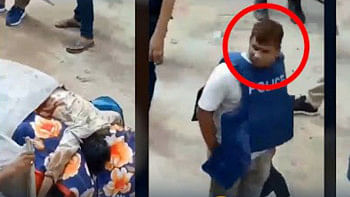History and the search for scapegoats
HISTORY, for some men, has regularly been a search for scapegoats to explain away some monumental failures. It is a feature of the collective human experience that will likely not go away any time soon. Watch Saifur Rahman. He has, for yet one more time, decided to retire from politics. There can be nothing wrong with that, considering that Rahman has had a rather long day in the sun and considering too that his party is now in a state of bad health.
But what is surely not very comforting to hear is the former finance minister's pinning all the blame for the shame in which the Bangladesh Nationalist Party finds itself today on Abdul Mannan Bhuiyan.
With that one remark, Saifur Rahman has tried to gloss over the misdemeanour of the BNP and the grasping nature of its leading lights in the years they held political office, until the 2007 state of emergency came along. Not a word about the doings of his children or of the children of his party leader. Not a whisper about ministers and lawmakers who left the country gasping for breath.
All that matters now is to find someone to blame for everything that has gone wrong with the party. And the wrong the party did to the country? Ah, that is an irritating question that could only muddy the waters. Think of post-1971 Pakistan. Yahya Khan blamed Bhutto for the loss of East Pakistan. For his part, Bhutto thought Yahya was a bumpkin who had led the country to disaster. Neither man was willing to admit his own share in the making of the tragedy. Neither blamed the rapacious Pakistan army for what had happened.
For all its devotion to democratic ideals, India took many steps backward when Indira Gandhi foisted a brutal state of emergency on it in 1975. Her ministers went sycophantic, encouraging her callow son Sanjay in committing the excesses that would lead to the Congress' electoral debacle two years later. And yet these sycophants, most of them, swiftly pinned the blame for all the emergency-era trouble on Sanjay Gandhi.
It was a useful way of handling the past, as Nikita Khrushchev would demonstrate in 1956 through lashing out at the dead Joseph Stalin. As a Stalin loyalist, Khrushchev faithfully carried out the supreme leader's orders on torture, executions and deportations. He was an accessory to Stalin's crimes and yet he felt not at all embarrassed when, at the 20th party congress, he decided that Stalin had to be made the scapegoat for the dark deeds of the past.
Lavrenti Beria, always in league with Khrushchev, was with alacrity dispatched. In September 1965, a well-laid out conspiracy led to the murder of six generals and undermined President Sukarno in Indonesia. The army lost little time in painting the entire macabre happening as a communist conspiracy. The scapegoat, the PKI leader D.N. Aidit, was brutally done away with.
Closer to our times, there is the image of Robert Mugabe outliving his usefulness and yet remaining adamant about not letting go of Zimbabwe. The country's problems, he believes, are not of his making but of its white minority.
The solution; run those whites out of their land and honey will flow all over.
Today it is high inflation, which sings through the dry, drooping grass. Travel back to the Vietnam War. There are, even today, ageing Americans who believe that it was the liberals and the media that made America lose the war. And Richard Nixon, deeply distrustful of newsmen and newspapers till his dying day, believed that they were responsible for the troubled times he spent in the White House. If anything went wrong, blame the media. That was policy.
These days you get to hear a lot about the battering the LTTE is getting at the hands of the Sri Lankan army. Maybe the Tigers will bite the dust, maybe the conflict could yet go on for years. That is not the point. What is important is that the majority Sinhalese have always found in the LTTE the perfect scapegoat for the long war that has gone on.
And yet it was S.D.R.D. Bandaranaike who in the 1950s initiated all those political measures that would discriminate against Sri Lanka's Tamils, that would lead to the rise of the ruthless Velupillai Prabhakaran in the 1980s. The Chinese communists under Mao went looking for scapegoats every time disaster overtook the country. Lin Piao was accused, after his death in a mysterious plane crash, of revisionism. The respected Liu Shao-chi was carted off to prison in 1966. He died there, lonely and forlorn, in 1969.
In history, there will forever be the putatively wise blundering into disaster. And when they do, they will go looking for innocent lambs to sacrifice in order to save their own reputation. Remember Gamal Abdel Nasser? He lost the war with Israel in June 1967 and then blamed Field Marshal Abdel Hakim Amer. Poor Amer then took his own life. Or was murdered.

 For all latest news, follow The Daily Star's Google News channel.
For all latest news, follow The Daily Star's Google News channel. 




Comments